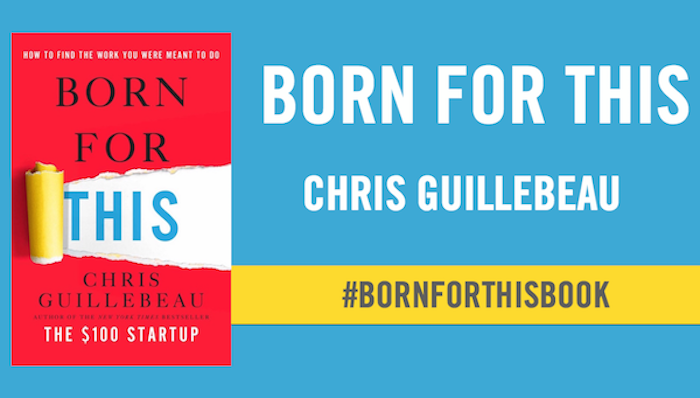A book that actually takes the pressure off ‘finding your passion’. It’s not so much about finding and focusing on the one thing that you were born for. It’s more about trying different things, taking calculated risks and thinking about the future.
A good book if you’re still working for someone else, feel stuck and don’t quite know what to do next.
My thoughts are in italics.
Born for this – Chris Guillebeau (highlights)
Even if you work for someone you’re still essentially self-employed. No one will look out for your interests as much as you.
What work would you do if you no longer needed money?
There’s more than one path you can pursue, and the may lead to the same place. There’s probably one path that’s best of all.
Social scripts, norms, expectations can be particularly unhelpful. Flip the script.
Kurt: Or run a scenario/test where you do the exact opposite of what everyone else is doing.
Don’t find a niche, live a well-rounded life. Many excel in environments that reward a complex blend of skills, talents, and interests.
If you miss one opportunity there will be others.
A dream job is what freedom feels like to each one of us.
Formula for work you were born to do: joy-money-flow (makes us happy, pays us, maximises our skills).
Not everything is possible. There are some career fantasies that you’ll never achieve.
You need engaging content and good conditions at your workplace.
Doing something new can contain risks. 1. Identify the hazards. 2. Don’t make decisions on fear of missing out.
Always have backup plans. Build scenarios: if/then.
Career insurance policy: more than one source of income, keep expenses lower than income, maintain good relationships with all.
There’s more than one way to do a job or get the qualifications you need.
Soft skills:
- Improve your writing and speaking ability. Be persuasive, be interesting, be confident and get other people on your side. Tell stories and decide on your first and last sentence.
- Learn to negotiate, look for win wins.
- Improve your ability to follow through and follow up.
- Become comfortable with useful technology.
Be so good they can’t ignore you.
Every year decide to quit what you’re doing, unless sticking at it is by far the best option. It teaches you to evaluate, even if you don’t end up quitting.
Kurt: I do this often. If I’m thinking of changing something major I pretend I’ve already changed it and really imagine what my life would be like with that change. I then think of what I miss about my life before the change. Sometimes you don’t need a change, you just need to appreciate what you already have. This helps you do that.
Everyone’s an expert at something.
The more we focus on solving other people’s problems, the more successful we will be.
Become a master problem-solver.
- Solving problems of daily life is usually the easiest and most successful approach. e.g. a step by step guide to saving on your power bill.
- Solving specific, measurable problems is better than attempting huge behaviour change (avoids overwhelm from your audience).
- To avoid getting off track, always ask ‘why should people care about this?’
Set up shop by talking to 100 people. Ask them what their biggest problems are, day to day problems. If they know you, ask them what they think you’re good at. The 100 person project.
When coming up with an action plan, don’t just think like a CEO issuing decrees, think like a janitor who has to implement them.
Warren Buffet on priorities: Write down the top 25 things you want to do in life. Circle the top 5. Discard the other 20.
Future planning: Create your CV from the future then live like that person. Pick projects that make you more like that person.
Everyone needs a side hustle or other source of income. It gives you security.
Always price your products/service based on value, not on the time it takes to make.
Reputation is your most valuable asset.
Set aside a ‘more money’ day. Take 8 hours to review your finances. What can you tweak? How can you spend less/earn more? Audit your credit card and bank statements.
When starting out: Do what you enjoy, find what you value and other people will pay you for, start quickly with low investment, assess and tweak.
You Inc. Invest in yourself. 1. Skills. 2. Connections. 3. Experiments. 4. Opportunities.
Zero to one test: 1 to n is a known increase. 0 to 1 is unknown and breaking completely new ground.
Weak ties can help more than close friends in finding opportunities.
As a writer, always write for one person, it shows in your writing.
Kurt: I write as if it’s a guide for my son to read when he grows up.
If you want to work for someone, make yourself invaluable, then work on your terms. Control your working conditions.
